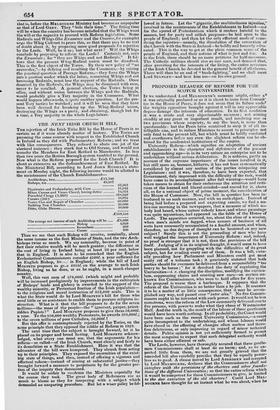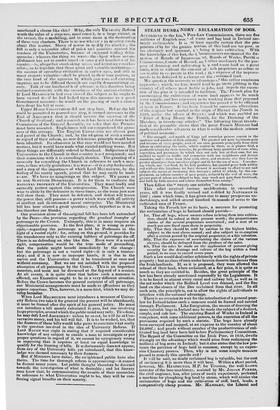PROPOSED MEASURE OF REFORM FOR l'ilE SCOTCH UNIVERSITIES.
IF we understand Lord MELBOURNE'S measure aright, either as it was originally produced or as it is about to issue from Commit- tee in time House of Peers, it does not seem that its failure under
the weighty opposition brought against it will in any appreciable degree damage the interests of education. In its first condition it was a crude and very objectionable measure ; not aiming steadily at any great or important result, and involving one or two provisions whose propriety, to say the least, is more than questionable: but the Peers have contrived to strip it of all in- two provisions whose propriety, to say the least, is more than questionable: but the Peers have contrived to strip it of all in- telligible aim and to induce Ministers to assent to principles not only fatal to the present bill, but which must be boldly combated and overthrown before any even the slightest reform can be ob- tained for the academical institutions of the empire.
University Reform—which signifies an adaptation of ancient establishments to the character and derficiencies of the present and approaching age—is in its very nature an enterprise not to be undertaken without serious deliberation. It is arduous, partly on account of the supreme importance of the issues involved in it, but still more so, because, hitherto, it has not been systematically considered by almost any section of the parties composing our Legislature: and it was, therefore, to have been expected, that Government, duly impressed with the difficulty of the task, would have come to its accomplishment after full warning—would have taken means to obtain for their endeavour the attention and criti- cism of the learned and liberal-minded—and craved for it, above all, as for a national object of prime moment. the consideration of the House of Commons. Now, the bill in question has been in-
troduced in no such manner, and with no such object. Instead of being laid before a prepared and expecting senate, we find a no- tice one morning in the newspapers, that a measure of which no- body had heard, whose nature nobody knew, and whose parentage was quite mysterious, had appeared on the table of the House of Lords. The apparition occurred, too, about the close of a session, when men's minds are fagged, when arrears of business of all sorts have necessarily accumulated to a fearful amount, and when, therefore, no due degree of thought can be bestowed on any new subject! Surely this is not the proceeding of men who have well weighed the importance of University Reform : and, indeed, no proof is stronger that it is not, than the provisions of the bill itself. Judging of it in its original draught, it would seem to have been planned, not for grappling with the difficulties of its great subject, but for evading every one of them. It was a bill, virtu- ally providing how Parliament and Ministers could get most easily rid of a toilsome task ; it graciously statuted that both parties should for evermore be delivered from a responsibility "too heavy to be borne ;" for it devolved the duty Of regulating the Universities—i. e. changing the discipline, modifying the curricu- lum, suppressing chairs and erecting new ones—on certain un- known five Commissioners, who were to hold office for five years. The proposal is worse than a burlesque. It supposes that the reform of the Universities is no better than a by-job. It assumes it to be a matter of so littie consequence, that it may be accom- plished any way, and passed over "inter alia." No five Commis- sioners ought to be intrusted with such power. It would not be less monstrous, were the reform of the Law summarily delivered over to five persons, with power to make what they chose of Westminster Hall. And the truth is, the result of the labour of these gentlemen would have been worth nothing. In all probability, theCourt would have been such as the recent University Commission,—a court quite incompetent to the undertaking, and whose labours would have closed in the effecting of changes often useless and there- fore deleterious, or only improving in regard of minor technical details. Public opinion is not yet sufficiently formed to permit time most sanguine to expect that such delegated authority would have been either efficient or safe.
The Lords, however, have thoroughly secured that these gentle- men Commissioners shall at least do no harm; and, as we ex- pected little from them, we are not greatly grieved that the amended bill also carefully provides that they be equally power- less as to good. A clause moved by Lord ABERDEEN and accepted by Lord MELBOURNE, declares that the Commissioners shall not intetlere with the provisions of the charters and other founda- tions of the different Universities; so that the entire reform which it would be competent for these Commissioners to give, is limited to the due execution of the old charters! Could Lord MEL- BOURNE have thought for an instant what he was about, when he sanctioned a clause like this? Why, the only Un'versity Reform worth the value of a sixpence, muat consi-t, to a large exteet, in the revise], the re modelling, and in some cases 'n the destruce.ou of these very charters. There is no use whatev r in mewing words about this matter. Shorn of power to ne dify t he chartere the bill is only a miserable afleir of pains and penalties. against the trustees of the Universities, because of suprosed tiilhuig deliti- quencies : whereas the thing we want— the sbjeet whose amen- plishment has yet to confer laurel In some g: eit benefactor of his country—is, altogether overleoking mieor and irritating consieer- aliens, so to legislate that those great and valuable institutions— the sources of spreading civilization in earlier ages, and still in many respects valuable—shall be placed in t heir true position, tit the very head of the agencies by which gensrous ut4 e4trating impulses are to be diffused through our rapidly democratizing so- ciety. Talk of one hairbreadt h of advance hi tles direction being realized consistently with the sacredness of the ancient charters! If Lord MELBOURNE bad ever viewed the subject as he ought to have viewed it—it he had looked upon this measure as a ereat Government measure—he would on the passing of such a clause have dropt his bill at once. Upper House Conservatism did not stop here. Belem the bill could be permitted to proceed olio step, it seemed necessary to the Earl of ABERDEEN that it should receive the saection of the Church of Scotland ; and it:est-need' as it has been sent down to t he Commission of the General Assembly, we infer that the Premier must have assented. Englishmen will Dot comprehend the gross- ness of this outrage. The English Universities are almost part and parcel of the Church ; and, by the adoption of such a course in regard of their reform, no new deleterious principle would have been admitted. Its admission in this case would not have mended matters, but it would have made what existed nothing worse. But these things are differently ordered in Scotland. Subjection of the Universities to the Church in that country is not recognized; and their connexion with it is exceedingly slender. The granting of a necessity for consulting the Church in reference to such a mea- sure, is thus wholly gratuitous: it is worse—it is a step backwards; and a step of the importance of which Lord MELBOURNE, by the feeling of his manly speech, proved that he may easily be made an are. We have no misgivings on this subject. WE REFER IT TO TIIE SCOTTISH DISSENTERS. It is for them to vindicate the NATIONAL PROPERTY of the Universities. They must loudly and -earnestly protest against this retrogression. The Church were wise to abide by the defensive in these times, as the issue just now will show them. They must be defeated, and defeat will lessen the power they still possess—a power which wars with all activity of intellect and disinterested moral enterprise. The Ministerial bill has here stirred a great question; and, imperfect as it is, it has therefore our thanks.
One provision alone of thesoriginal bill has been left untouched by the Peers—the provision regarding the gradual transfer of patronage to the Crown. Unhappily, this is in many respects an objectionable provision. In the first place, it is wrong in prin- ciple,—regarding the patronage as held by Professors in the light of a vested right; for, acting on this ground, it provides for the transference only as the existing holders of patronage die off. There is no defending an idea like this. Even were it a vested right, compensation would be the true mode of proceeding, that the public might benefit immediately by the change: but the patronage is not a vested right—it is only a trustee- ship; and if it is now in improper hands, it is due to the nation and the Universities that it be transferred at once and without ceremony. But we are not satisfied with the proposed absorption of all patronage by the Crown. This is an important measure, and must not be discussed at the fag-end of a session. At all events, it is quite clear that before such a measure is effected, our Executive ought to be in a very different situation. Before the Crown becomes the general recipient of all patronage, our Ministerial arrangements must be made as efficacious as they appear capacious. This, however, is a mere hint, which we may de- velop hereafter.
When Lord MELBOURNE next introduces a measure of Univer- sity Reform (we take it for granted the present will be abandoned), it must be framed after the spirit of his general policy. He must not introduce a bill merely calculated to pass, but one involving large principles, around which the public mind may rally. This done, be may defy Lord ABERDEEN: unless he so act, he will lie at Con- servative mercy, and his bill will fail. It is to be wished, too, that the framers of these bills would take pains to ascertain what really IS the question involved in the idea of University Reform. If Lord BACON was right in stating that it required considerable knowledge of any subject to enable a man to investigate or put proper questions in regard of it, we cannot he egregiously wrong in supposing that it requires at least an equal knowledge to qualify for the framing of bills. It unfortunately does not appear, from any of the University bills yet introduced, that this know- ledge was deemed necessary by their framers. But if Ministers have duties, the en!ightened public have also theirs. The time for thorough reform is approaching—it cannot be distant many years. Let public thought therefore be directed towards the investigation of what is desirable ; and let literary men know that, by communicating the results of their researches in reference to what Universities ought to be, they will be con- ferring signal benefits on their country.



























 Previous page
Previous page